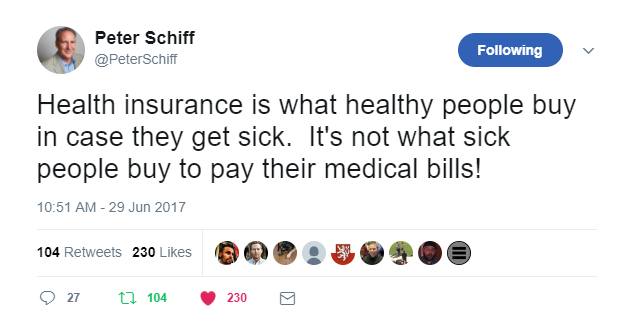Free Market Alternatives to Obamacare

By Jeff Paul
Why do car insurance companies charge more for teenage boy drivers? Because they pose a higher risk of filing an insurance claim from accidents, mud bogging, speeding tickets, etc. Insurance companies must manage a pool of risk against potential expenses. Riskier participants pay a higher premium. This is not rocket science.
Yet health insurance companies are now prevented by the Obamacare law from charging a higher premium to “riskier” clients. Thus the cost of insurance premiums and copays had to be raised on healthy people to absorb this perversion.
Peter Schiff stated it perfectly in a recent tweet:
Today, health insurance costs about the same for a family of four as a mortgage payment for the typical single family home. If, God forbid, you actually need care, the yearly deductible is usually equal to yet another annual mortgage payment. And if you fail to purchase this overpriced garbage, you get fined by the government. Can you say mafia racket?
Shortly into his Administration, Donald Trump signed an Executive Order (Minimizing the Economic Burden of the Patient Protection and Affordable Care Act Pending Repeal) instructing the IRS and other agencies to ignore penalties under Obamacare.
The Executive Order directs agency heads to “waive, defer, grant exemptions from, or delay the implementation of any provision or requirement of the Act that would impose a fiscal burden on any State or a cost, fee, tax, penalty, or regulatory burden on individuals, families, healthcare providers, health insurers, patients, recipients of healthcare services, purchasers of health insurance, or makers of medical devices, products, or medications.”
This set the tone for what many hoped would be a complete repeal of Obamacare. However, it looks like politics as usual is taking over and Trumpcare looks a lot like Obamacare Light with very few changes. Luckily there are a few options for you to save money on health care no matter what bill gets passed.
For now it appears the IRS has backed off from pursuing fines if you fail to carry health insurance. This frees you up to seek more affordable options. However, no matter what route you decide to take, there’s only one way to make sure your medical costs are as low as possible: GET HEALTHIER!
You cannot control the laws. You cannot control the costs. You cannot control the system. What you can control is how you take care of yourself. The less medical attention you need, the less you’ll pay.
You don’t need an elaborate plan to be healthy. Being healthy is super simple. It’s discipline that’s difficult.
Here’s a simple daily health checklist:
- Eat real food
- Drink clean water
- Move your body
- Get enough sleep
- Meditate, pray, or journal
Touch those bases each day. Build habits around them. And you will drastically reduce your chances of needing medical attention.
Four Free Market Alternatives to Obamacare
Tax-Free Health Savings Accounts
Whether you have a normal job or you’re self-employed, opening a Health Savings Account (HSA) or Flexible Spending Account (FSA) is a must. The accounts allow you to save and grow pre-tax income to pay out-of-pocket medical expenses. These are the most tax-friendly accounts you can open.
HSA
To qualify for a Health Savings Account, you must be enrolled in a high-deductible health plan that doesn’t cover all your medical expenses. Most plans qualify these days.
HSAs have triple tax advantages: 1) You fund them with pre-tax income, 2) account value grows tax-free, and 3) you can spend funds tax-free if used for qualified medical expenses.
Funds in an HSA can be invested similar to an individual retirement account (IRA). Just as with a self-directed IRAs, health savings accounts can also be self-directed into CDs, stocks, bonds, mutual funds, real estate, precious metals, public and private stock, notes, and more. Plus, once you reach age 65, all non-medical withdrawals are taxed at your current tax rate, just like a traditional IRA.



